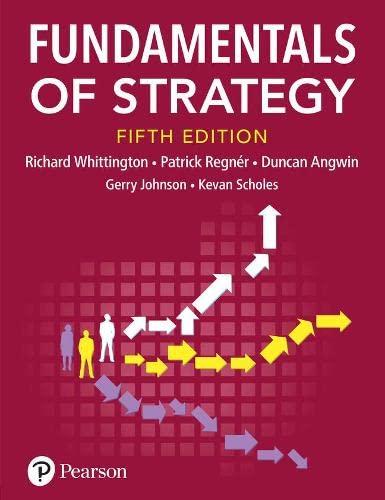2 Referring to Section 5.3.1, analyse Ubers culture under Travis Kalanick in terms of values, beliefs, behaviours
Question:
2 Referring to Section 5.3.1, analyse Uber’s culture under Travis Kalanick in terms of values, beliefs, behaviours and taken-for-granted assumptions (the
‘paradigm’). How much has this culture changed and how consistent is it across Uber as a whole? Uber was only founded in 2010, but already it has a full and controversial history. Its culture has been widely described as ‘toxic’. As it aimed for an Initial Public Offering in 2019, with a rumoured target valuation of more than $120bn, it was critical to persuade potential investors that the company had achieved real cultural change.
Uber’s foundational years For Uber, the years to 2017 were heavily marked by its entrepreneurial chief executive and cofounder, Travis Kalanick.
A product of the Californian tech culture, Kalanick already had a mixed entrepreneurial record when he started the Uber taxi company. His first business, Scour, was a peer-to-peer sharing business, sued by numerous publishers and bankrupt in 2000. His second business, Red Swoosh, was another peer-to-peer business, which was successfully sold for $19m in 2007, despite Kalanick’s committal for tax fraud and perjury. Kalanick’s personal style in the early years was unusual: he wore a cowboy hat and referred to himself as the Wolf, after the apparently cool fixer in the violent Tarantino film Pulp Fiction.
At the same time, Kalanick was a fan of the libertarian philosopher Ayn Rand, adopting as his Twitter avatar the cover of her book The Fountainhead, a celebration of heroic individualism.
Given this personal background, Uber’s name is probably no accident: it recalls the notion of Übermensch
(‘superior being’) associated with the German philosopher Friedrich Nietzsche (famous for declaring the death of God). Uber’s launch was certainly highly aggressive, seeking to be among the first to enter cities internationally and then working quickly to establish local dominance.
This search for early-mover advantage frequently involved defying local regulations regarding car-hire businesses. Kalanick’s philosophy was one of ‘principled confrontation’.
The motto was: ‘it is easier to ask for forgiveness than for permission.’ Uber would typically commence operations in a city, then, if faced by regulatory opposition, mobilise public support and professional lobbyists to campaign for regulatory change. In Portland, Oregon, the transportation commissioner called Uber’s management ‘a bunch of thugs’. By the end of 2015, however, Uber was already operating in about 400 cities around the world, from Abu Dhabi to Zurich. Revenues were $1.5bn (€1.3bn; £1.1bn)
Step by Step Answer:

Fundamentals Of Strategy
ISBN: 9781292351377
5th Edition
Authors: Richard Whittington, Patrick Regner, Duncan Angwin, Gerry Johnson, Kevan Scholes





